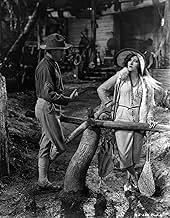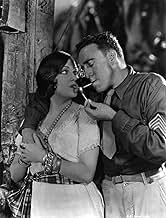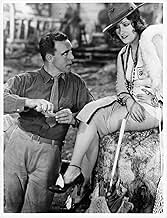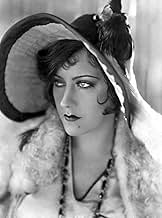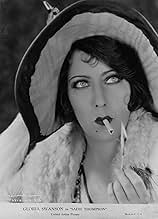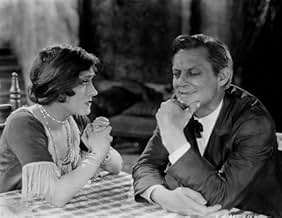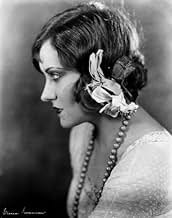AVALIAÇÃO DA IMDb
7,2/10
3 mil
SUA AVALIAÇÃO
Adicionar um enredo no seu idiomaA prostitute seeking a fresh start becomes the obsession of a religious extremist.A prostitute seeking a fresh start becomes the obsession of a religious extremist.A prostitute seeking a fresh start becomes the obsession of a religious extremist.
- Direção
- Roteiristas
- Artistas
- Indicado a 2 Oscars
- 3 vitórias e 2 indicações no total
Charles Sullivan
- Marine
- (não creditado)
Avaliações em destaque
Sadie Thompson (1928) :
Brief Review -
Raoul Walsh's zealous attempt to discover new proportions of human redemption powered by Gloria Swanson's Amazing performance. Walsh was a known name after he made the Magnum Opus 'The Thief Of Bagdad' (1924), before making this film. So it was unlikely to expect another gigantic adventure from him with a female-led film. Sadie Thompson has some issues in the climax, which might have been controversial for that time, but today when I look at the film, I understand his zealousness. Especially in the character played by Lionel Barrymore. It's a Gloria Swanson-led film alright but this character keeps tangling you. One just can't say whether he is a villain or a good soul. The same goes with Sadie's character too. You know she is a prostitute yet you want to see her get reformed. However, one must realise that it's not that easy. You just can't reform yourself just after you have decided, there's a process to test your ability. Sadie Thompson is a well made film in that sense. The way it shows that process and the desperate nature of all three leading actors, but the film gets a little messy and confusing at the end. There could be some valid reasons for that, philosophical or religious ones, but I don't want to get into such conversations. Sadie Thompson tells the story of a "fallen woman" who comes to Pago Pago to start a new life, but encounters a zealous missionary who wants to force her back to her former life. Her love story isn't formed well, too rushed I mean, but okay. The performances of all three leading actors makes it a must watch. Whatever remakes and adaptations are available out there, are not worthy enough. So prefer this first copy. It's no match to Raoul Walsh's best works like 'The Thief Of Bagdad' and 'White Heat', but as good as his 'High Sierra', and better than 'The Roaring Twenties'.
RATING - 7/10*
By - #samthebestest.
Raoul Walsh's zealous attempt to discover new proportions of human redemption powered by Gloria Swanson's Amazing performance. Walsh was a known name after he made the Magnum Opus 'The Thief Of Bagdad' (1924), before making this film. So it was unlikely to expect another gigantic adventure from him with a female-led film. Sadie Thompson has some issues in the climax, which might have been controversial for that time, but today when I look at the film, I understand his zealousness. Especially in the character played by Lionel Barrymore. It's a Gloria Swanson-led film alright but this character keeps tangling you. One just can't say whether he is a villain or a good soul. The same goes with Sadie's character too. You know she is a prostitute yet you want to see her get reformed. However, one must realise that it's not that easy. You just can't reform yourself just after you have decided, there's a process to test your ability. Sadie Thompson is a well made film in that sense. The way it shows that process and the desperate nature of all three leading actors, but the film gets a little messy and confusing at the end. There could be some valid reasons for that, philosophical or religious ones, but I don't want to get into such conversations. Sadie Thompson tells the story of a "fallen woman" who comes to Pago Pago to start a new life, but encounters a zealous missionary who wants to force her back to her former life. Her love story isn't formed well, too rushed I mean, but okay. The performances of all three leading actors makes it a must watch. Whatever remakes and adaptations are available out there, are not worthy enough. So prefer this first copy. It's no match to Raoul Walsh's best works like 'The Thief Of Bagdad' and 'White Heat', but as good as his 'High Sierra', and better than 'The Roaring Twenties'.
RATING - 7/10*
By - #samthebestest.
For those who would pigeonhole Raoul Walsh as an "action master" or "man's director", this small-focus drama with a female protagonist might seem at odds with his image. In fact, while he was a versatile director who could turn out a rousing action scene, it was the drama particularly in the relationships between individuals that was Walsh's greatest strength. Sadie Thompson in fact shows us his mastery of the technique in its purest form.
Walsh himself made the adaptation from the play "Rain", not as easy a task as it sounds a play has to convey action through dialogue, while a silent film does the exact opposite. Sadie Thompson begins with a series of autograph mottos from each character, a rather clumsy way to introduce character. This is immediately followed however with a particularly smooth bit of film-making. We are given a point-of-view shot, as Swanson looks down at the group of soldiers on the shore, then we cut back to her, and the camera pulls back as she descends the gang plank. A few shots later the camera is dollying forward, following Swanson and the soldiers hovering around her. In this handful of shots we are subtly informed of Miss Thompson's profession, but also with those attention-grabbing point-of-view shots and camera movements we, the audience, are placed into the position of the characters. Walsh has drawn us into the story at this crucial establishing moment.
Considering it only really revolves around two developing relationships that between Sadie and Tim, and that between Sadie and Davidson the main part of the film is like a tour-de-force of different ways to shoot interaction between two people. The scenes between Swanson and Walsh are given the customary tenderness of a regular romance, with some delicate shot compositions that give it a natural, harmonious feel. The relationship between Swanson and Barrymore in contrast is full of intensity lots of cuts, faces framed in stark close-up. What is particularly neat, is that all of the major dialogue scenes begin with a fair few title cards getting the unavoidable wordy bits out of the way first but then the dialogue fizzles out and the interaction continues with just the images, back and forth.
Of course, the effectiveness of the drama would be lost without great acting and, yes, this probably is Swanson's finest performance prior to Sunset Boulevard. I think Swanson was at her best when she was really allowed to let go, and put all her energy into a character, and to say she does that here would be an understatement. Lionel Barrymore is fine as the archetypal repressed Christian, a little hammy perhaps but then, he is a Barrymore. And Walsh himself absolutely acts his socks off, actually turning in the deepest performance of the picture, and the fact that his acting days were soon to be cut short is one of several tragedies regarding his career.
Speaking of tragedies, looming over Sadie Thompson is the unfortunate loss of the final reel, which has since been semi-reconstructed with stills and titles. While what we see today suffers from a very noticeable lack of a climax, the dramatic build up comes close to perfection. Considering its small scale and lack of action, Sadie Thompson was apparently a massive popular success. In his autobiography Raoul Walsh quotes several letters he apparently received from prostitutes of various nationalities which, while they may well have been fabricated or exaggerated slightly, are probably accurate at least in tone. By contrast the 1932 talkie version was a flop, despite an equally great cast, testament to Walsh's talent as a director of powerful cinematic drama.
Walsh himself made the adaptation from the play "Rain", not as easy a task as it sounds a play has to convey action through dialogue, while a silent film does the exact opposite. Sadie Thompson begins with a series of autograph mottos from each character, a rather clumsy way to introduce character. This is immediately followed however with a particularly smooth bit of film-making. We are given a point-of-view shot, as Swanson looks down at the group of soldiers on the shore, then we cut back to her, and the camera pulls back as she descends the gang plank. A few shots later the camera is dollying forward, following Swanson and the soldiers hovering around her. In this handful of shots we are subtly informed of Miss Thompson's profession, but also with those attention-grabbing point-of-view shots and camera movements we, the audience, are placed into the position of the characters. Walsh has drawn us into the story at this crucial establishing moment.
Considering it only really revolves around two developing relationships that between Sadie and Tim, and that between Sadie and Davidson the main part of the film is like a tour-de-force of different ways to shoot interaction between two people. The scenes between Swanson and Walsh are given the customary tenderness of a regular romance, with some delicate shot compositions that give it a natural, harmonious feel. The relationship between Swanson and Barrymore in contrast is full of intensity lots of cuts, faces framed in stark close-up. What is particularly neat, is that all of the major dialogue scenes begin with a fair few title cards getting the unavoidable wordy bits out of the way first but then the dialogue fizzles out and the interaction continues with just the images, back and forth.
Of course, the effectiveness of the drama would be lost without great acting and, yes, this probably is Swanson's finest performance prior to Sunset Boulevard. I think Swanson was at her best when she was really allowed to let go, and put all her energy into a character, and to say she does that here would be an understatement. Lionel Barrymore is fine as the archetypal repressed Christian, a little hammy perhaps but then, he is a Barrymore. And Walsh himself absolutely acts his socks off, actually turning in the deepest performance of the picture, and the fact that his acting days were soon to be cut short is one of several tragedies regarding his career.
Speaking of tragedies, looming over Sadie Thompson is the unfortunate loss of the final reel, which has since been semi-reconstructed with stills and titles. While what we see today suffers from a very noticeable lack of a climax, the dramatic build up comes close to perfection. Considering its small scale and lack of action, Sadie Thompson was apparently a massive popular success. In his autobiography Raoul Walsh quotes several letters he apparently received from prostitutes of various nationalities which, while they may well have been fabricated or exaggerated slightly, are probably accurate at least in tone. By contrast the 1932 talkie version was a flop, despite an equally great cast, testament to Walsh's talent as a director of powerful cinematic drama.
I had only seen Gloria Swanson in her more mature role in Sunset Boulevard and not in her heyday. She is gorgeous downright hot and very convincing as Sadie Thompson. The version of the W. Somerset Maugham story is superior to the better know Joan Crawford version Rain. Lionel Barrymore does a fantastic job as the self serving preacher. Raoul Walsh the well know director appears here as the serviceman who is in love with Sadie.
What a performance - Swanson bursts out of the screen, as Somerset Maugham's prostitute heroine trapped on a tropical island with a crusading parson and a sexy sergeant. And Lionel Barrymore as the parson and the director Raoul Walsh as the sergeant are her match. This is silent acting at its best.
Yes the piece is a little stagey and the action too confined for a silent picture, but when the photography is as brilliant as it is here - who cares? It deservedly won the first ever Oscar for cinematography.
This is a passionate and beautiful production. What a tragedy that the last few minutes have been lost. They have been reconstructed using titles and stills - but how I would have loved to have seen the scene when Barrymore rapes Swanson. It must have been breathtaking. Don't miss this film.
Yes the piece is a little stagey and the action too confined for a silent picture, but when the photography is as brilliant as it is here - who cares? It deservedly won the first ever Oscar for cinematography.
This is a passionate and beautiful production. What a tragedy that the last few minutes have been lost. They have been reconstructed using titles and stills - but how I would have loved to have seen the scene when Barrymore rapes Swanson. It must have been breathtaking. Don't miss this film.
It's sad that we don't have on film Jeanne Eagels and her performance from Broadway of the classic Rain. I'm told there was something truly special about it. But having said that Gloria Swanson has given us one riveting performance as Sadie Thompson, the girl that gets everyone thinking from below decks in the South Seas.
With the exception of Rita Hayworth's version, I have something nice to say about all the screen Sadies. You've got to be both one sexy dish and an extraordinary actress to pull this role off. In Gloria Swanson and Joan Crawford we've had both.
W. Somerset Maugham long before Tennessee Williams was writing about taboo sexual subjects and people bought his books and saw the plays and movies from them. Rain is the granddaddy of them all. Maugham as a gay man just asks a simple question, why don't people just let people alone to do their thing if it doesn't harm anyone?
That's the attitude in rollicking Marine sergeant Raoul Walsh who is stationed on the tropical south sea paradise that Sadie Thompson finds herself stranded. Walsh who directed also gives us an opportunity to see him before he lost an eye a couple of years later.
Also there is Lionel Barrymore and his wife Blanche Frederici, the Reverend Davidson. One of the most uptight people in literature it's like he's got to destroy the thing he lusts for, but can't have because of convention and the beliefs drummed into him. In a nutshell you have a ton of religious and political figures, closeted gays who are outwardly rightwing homophobes. Maugham knew them well.
So with one look, Barrymore takes a most personal interest in the 'salvation' of Sadie Thompson. But it's all a cover and in the end when his world is exposed it's the end for him.
Rain will be getting productions ad infinitum although they might be underground productions as per the local mores until the end of time. Sadie Thompson got two Oscar nominations in the first Oscar ceremony, one for Gloria Swanson as Best Actress and one for cinematography.
Not a film to be missed.
With the exception of Rita Hayworth's version, I have something nice to say about all the screen Sadies. You've got to be both one sexy dish and an extraordinary actress to pull this role off. In Gloria Swanson and Joan Crawford we've had both.
W. Somerset Maugham long before Tennessee Williams was writing about taboo sexual subjects and people bought his books and saw the plays and movies from them. Rain is the granddaddy of them all. Maugham as a gay man just asks a simple question, why don't people just let people alone to do their thing if it doesn't harm anyone?
That's the attitude in rollicking Marine sergeant Raoul Walsh who is stationed on the tropical south sea paradise that Sadie Thompson finds herself stranded. Walsh who directed also gives us an opportunity to see him before he lost an eye a couple of years later.
Also there is Lionel Barrymore and his wife Blanche Frederici, the Reverend Davidson. One of the most uptight people in literature it's like he's got to destroy the thing he lusts for, but can't have because of convention and the beliefs drummed into him. In a nutshell you have a ton of religious and political figures, closeted gays who are outwardly rightwing homophobes. Maugham knew them well.
So with one look, Barrymore takes a most personal interest in the 'salvation' of Sadie Thompson. But it's all a cover and in the end when his world is exposed it's the end for him.
Rain will be getting productions ad infinitum although they might be underground productions as per the local mores until the end of time. Sadie Thompson got two Oscar nominations in the first Oscar ceremony, one for Gloria Swanson as Best Actress and one for cinematography.
Not a film to be missed.
Você sabia?
- CuriosidadesUnseen for many years because the last reel had decomposed, the final eight minutes have been reconstructed using production stills and title cards, allowing modern audiences to see an approximation of the complete film.
- Erros de gravaçãoAt the beginning of the film, Mr. and Mrs. Davidson each write a quotation in the ship's autograph book. Their handwriting appears identical, revealing that neither actor actually wrote what is shown on screen.
- Citações
Sadie Thompson: [screaming at Alfred Davidson] Was I doing you any harm? You bloodthirsty buzzard! Was I? Who gave you the right to pass judgement on me? You psalm-singing louse! You'd tear out your own mother's heart, if she didn't agree with you, and call it saving her soul!
- Versões alternativasOriginally released at 97 minutes. Out of circulation for decades because the final reel of the picture was destroyed due to film decay.
- ConexõesEdited into Spisok korabley (2008)
Principais escolhas
Faça login para avaliar e ver a lista de recomendações personalizadas
Detalhes
- Data de lançamento
- País de origem
- Idioma
- Também conhecido como
- Sadie Thompson
- Locações de filme
- Two Harbors, Santa Catalina Island, Channel Islands, Califórnia, EUA(some Pago Pago exteriors)
- Empresa de produção
- Consulte mais créditos da empresa na IMDbPro
Bilheteria
- Orçamento
- US$ 650.000 (estimativa)
- Tempo de duração
- 1 h 37 min(97 min)
- Mixagem de som
- Proporção
- 1.33 : 1
Contribua para esta página
Sugerir uma alteração ou adicionar conteúdo ausente

